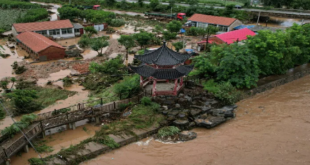03-12-2022
HAGUE: The International Court of Justice (ICJ) has declined to issue a decision in an international dispute over the Silala River, one of several water-related issues that have spurred tensions between Chile and Bolivia.
Chile is in the middle of an historic, massive 13-year drought, and Bolivia is likewise experiencing parched conditions, as La Nina weather conditions return to the region for a third straight year, causing a shortage of rain but  in its judgement on Thursday, the Hague-based, United Nations court said the two countries appeared to be in agreement about the river’s status as “an international watercourse”, subject to international law.
in its judgement on Thursday, the Hague-based, United Nations court said the two countries appeared to be in agreement about the river’s status as “an international watercourse”, subject to international law.
The judges urged the South American neighbors to work together on issues surrounding the frontier waterway, saying a “shared resource can only be protected through cooperation”.
The dispute over the Silala stretches back to 1999, when Bolivia’s Ministry of Foreign Affairs addressed a statement to Chile that said the Silala lacked “any characteristic of a river, let alone of an international river of a successive course”.
The Bolivian government instead described the Silala as a wetland, originating from springs on the Bolivian side of the border. It asserted that the water’s flow had been created by means of “artificially enhanced” channels and draining mechanisms.
The dispute escalated in June 2016 when Chile filed a lawsuit calling on the international court to declare the Silala an international waterway, after Bolivia indicated it would charge for use of its waters.
 Mining operations on the Chilean side of the border rely, in part, on the Silala’s waters, which flow through the Atacama Desert, one of the driest places on earth.
Mining operations on the Chilean side of the border rely, in part, on the Silala’s waters, which flow through the Atacama Desert, one of the driest places on earth.
“Because of the underlying issues of politics, economics, sovereignty and history, the Silala has become one of the most hydro-politically vulnerable basins in the world,” a 2007 United Nations report said, citing the Silala’s use in Chile’s copper-mining industry but Bolivia counter-sued, claiming that Chile had “illegally” taken the Silala’s water. It also asserted sovereignty over the channels and draining mechanisms built on its side of the Silala, asking that the court acknowledge its right to demand compensation for any water delivered through those artificial channels.
“They stole our water and showed us what kind of neighbor them could be,” then-President Evo Morales of Bolivia said in 2016 but over the course of the six-year lawsuit, the judges found that there was “acknowledgement by Bolivia during oral proceedings that the Silala waters qualify in their entirety as an international watercourse under customary international law”.
The judgement by the ICJ, the UN court for resolving disputes between states, also said that international law applies to both “naturally flowing” and “artificially enhanced” surface flow on the river. (Int’l Monitoring Desk)
 Pressmediaofindia
Pressmediaofindia




